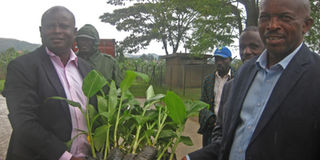Lyantonde, Kalungu farmers reject new coffee seedlings

Lyantonde District chairperson Fred Muhangi (right) and Dr Ronald Bameka (left), the deputy district veterinary officer, receive banana suckers on April 4. PHOTO BY PAUL SSEKANDI
KALUNGU/LYANTONDE- Farmers in Kalungu and Lyantonde districts have rejected a government proposal to supply them with more coffee and citrus fruit seedlings.
The farmers say government should instead focus on supplying banana suckers to enable them revive their banana plantations which were affected by wilt.
Mr John Kiragga, the chairperson of Kalungu Town Council, said the continued distribution of coffee seedlings is a waste of taxpayers’ money since many farmers lack enough land.
“What is happening is a waste of taxpayers’ money, the suppliers simply bring the seedlings and dump them at residents’ doorsteps. Let government give us banana suckers and we boost food security in the district,” he said during an interview on Saturday
Mr Kiragga said Masaka Sub-region, which used to be the leading producer of matooke [bananas] in 1960s up to early 1990s, is currently struggling and buys from western Uganda.
“It is embarrassing to see trucks loaded with matooke coming from the western region, supplying to our villages in Kalungu, Kyamuliibwa, Lwabenge and other towns, yet we used to be the major suppliers of matooke in the whole country,’’ he said.
‘Focus on demand’
Mr Ernest Munene Kisambu, the chairperson of Kyamuliibwa Sub-county, also asked government to priotise distribution of tomato and vanilla seedlings, which he said are on high demand in Kenya and South Sudan.
Government, under Operation Wealth Creation (OWC), distributes free agricultural inputs to boost farming across the country. The most commonly distributed agricultural inputs are coffee, oranges, citrus fruit seedlings, cassava cuttings and pineapple suckers.
Mr Ephraim Kamugisha, the Lyantonde District council speaker, said the district council has rejected all seedlings that the farmers in the district never applied for.
“Those who supply the seedlings are required to first make a needs assessment survey before dispatching items to the beneficiaries, but because their focus is getting money, they simply supply anything they want, we are saying no, Lyantonde is not a dumping ground ,” he said.
Last month, Lyantonde District leadership rejected a total of 840 bags of cassava cuttings from OWC.
Mr Godfrey Nshemereirwe, the OWC coordinator in Lyantonde District, said he had earlier informed his superiors about the district’s decision to reject what they have not asked for, but he was surprised after he saw them deliver the items.
In the last planting season, farmers in the sub-counties of Mpumudde and Lyakajjula, also rejected pineapple suckers and cassava cuttings and the tonnes of the items are rotting at the sub-county headquarters.
Many residents in districts such as Bukomansimbi and Kole have in the past also refused to take seedlings, which government supplied, saying they were given the wrong items. They demanded that government replaces the seedlings with seeds such as maize, beans and soya beans.
Maj Tabaro Kiconco, the OWC spokesperson, said procurement of agricultural inputs and implements does not fall under their docket.
“We only oversee the distribution process. What I know, whenever there is need to procure inputs, the National Agricultural Advisory Services (Naads) secretariat sends advance slips to the district committees chaired by the chief administrative officers (CAOs) and the resident district officers, LC5 chairpersons, district agricultural officers, production officers and OWC coordinators, so the local leaders are fully involved and if there is any mistake, they are equally responsible,” Maj Tabaro said.
He advised farmers to always report to police whenever a supplier gives them inputs they did not request for.
“…and the CAOs shouldn’t process the payments,” he added.
In January OWC officials revealed that they were in the process of changing the current OWC strategy under which farm inputs will be given directly to individual farmers to a new system where the inputs will be distributed to farmer groups.
According to OWC, this will enable farms get higher yields and foster value addition of the agricultural produce.




